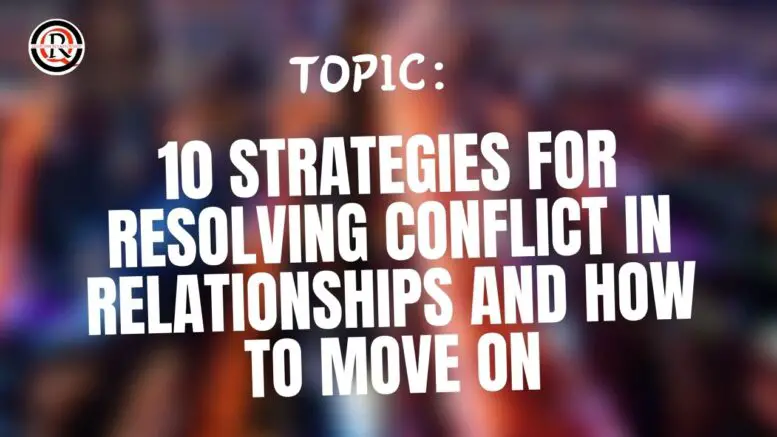Overcoming Conflict in Relationships: A Guide to Moving Forward
Introduction:
Conflict appears as an inevitable thread in the complex tapestry of interpersonal relationships and societal dynamics. Conflict has the ability to modify, test, and redefine our existence, whether it be on a personal level or in the context of larger world issues. It’s a complex energy that can take many different forms, from mild arguments to major conflicts that rock civilizations to the core.
As we set out on this investigative adventure, we find ourselves venturing into the intricate realm of conflict—a phenomenon that has historically served as both a cause of great human suffering and a catalyst for reform. It is necessary to dissect conflict in order to comprehend it, looking at its causes, expressions, and the significant effects it can have on people as individuals, groups, and countries.
Fundamentally, conflict arises from the dynamic interaction of many viewpoints, interests, and values. It results from conflicts between objectives, ideas, or resources; these conflicts are frequently exacerbated by the complexity of human nature and the innate diversity that defines our communities. Conflict must be faced in our quest for development, advancement, and cohabitation—not as an enemy to be avoided, but rather as a compelling force that requires our knowledge and attention.
This blog aims to explore the depths of conflict by dissecting it and exposing its complexity. We will investigate the psychological, sociological, and cultural aspects that lead to its formation, looking at what makes a difference in viewpoints become a full-fledged conflict. We will come across tales of tenacity, diplomacy, and resolution along the route together with those of upheaval, strife, and the ongoing human endeavor to establish common ground.
Throughout this exploration, we aim to provide insights into the mechanisms that perpetuate conflict and offer perspectives on how it can be managed, mitigated, and, in some cases, transformed into opportunities for positive change. The journey ahead invites us to question our assumptions, challenge our preconceptions, and engage in a thoughtful dialogue that transcends the superficiality of disagreements.
In a world where conflict is omnipresent, our ability to navigate its complexities is paramount. By gaining a deeper understanding of its roots and manifestations, we empower ourselves to foster unity, build bridges, and contribute to the collective journey toward a more harmonious coexistence. Join us as we embark on this enlightening expedition into the heart of conflict, exploring its shadows to uncover the potential for growth, understanding, and ultimately, resolution.
Conflict issues in Relationship
Love and companionship are the pillars of any thriving relationship, but the path to lasting connection is seldom free of challenges. Conflict, like an inevitable storm, can cast its shadow over even the most robust partnerships. Yet, it’s essential to recognize that conflict in relationships is not necessarily a sign of failure but rather an opportunity for growth, understanding, and strengthened bonds.
In this exploration of conflict issues in relationships, we’ll delve into the intricacies that often give rise to discord between partners. From communication breakdowns and unmet expectations to differences in values and external stressors, the sources of conflict are as diverse as the individuals involved. Our aim is to shed light on these issues, offering insights and strategies to navigate the turbulent waters of relationship challenges.
Communication stands as the cornerstone of any healthy relationship, and when it falters, conflict often takes center stage. Misunderstandings, unexpressed feelings, and a lack of effective communication can create a breeding ground for resentment. By addressing these communication pitfalls head-on, couples can pave the way for clearer understanding and more harmonious interactions.
Another common source of conflict revolves around unmet expectations. Whether related to roles, responsibilities, or emotional needs, unspoken assumptions can lead to feelings of neglect or disappointment. Exploring ways to openly discuss and align these expectations can foster a deeper connection and prevent potential conflicts from arising.
Differences in values and priorities also contribute to relationship tensions. Couples may find themselves at odds when it comes to issues like finances, family planning, or career goals. Understanding and respecting each other’s perspectives while finding common ground is key to resolving these conflicts and fostering a relationship that thrives on unity amid diversity.
External stressors, such as work pressures, family dynamics, or unexpected life events, can cast a shadow on a relationship. Learning to navigate these challenges as a team, supporting each other through thick and thin, can transform conflict into an opportunity for shared growth and resilience.
Throughout this exploration, we will provide practical tips, real-life anecdotes, and expert advice to help couples not only weather the storms of conflict but emerge stronger on the other side. By fostering open communication, mutual understanding, and a willingness to navigate the complexities of relationships, partners can transform conflict into a catalyst for deeper connection and a more resilient, fulfilling union. Join us on this journey as we unravel the layers of relationship conflict and discover the potential for lasting love beyond the challenges that may arise.
Causes of Conflict In Relationship
Unraveling Relationship Turmoil: Common Causes of Conflict
In the intricate dance of love and companionship, relationships often encounter the inevitable ebb and flow of conflict. Far from being a sign of failure, these clashes can serve as windows into the underlying dynamics of a partnership. Understanding the common causes of conflict in relationships is an essential step towards fostering resilience, communication, and ultimately, a stronger bond.
Communication Breakdown:
One of the primary contributors to relationship conflict is a breakdown in communication. Misunderstandings, unspoken expectations, and the inability to express feelings effectively can create a breeding ground for tension. Learning to communicate openly, actively listen, and articulate needs can pave the way for healthier interactions.
Unmet Expectations:
Unspoken or unmet expectations can lead to frustration and disappointment. Whether related to emotional needs, roles within the relationship, or future plans, addressing and aligning these expectations is crucial for preventing conflict. Honest conversations about each partner’s desires and aspirations can bridge the gap between assumptions and reality.
Differences in Values and Priorities:
Varied beliefs, values, and priorities can become a source of conflict. Disagreements may arise in areas such as finances, family planning, or career goals. Recognizing and respecting these differences while finding common ground is essential for navigating potential conflicts and building a relationship that thrives on unity amid diversity.
Intimacy Issues:
Challenges in physical or emotional intimacy can strain a relationship. Whether due to stress, changing life circumstances, or individual preferences, addressing these issues with sensitivity and empathy is crucial. Open communication, mutual understanding, and a willingness to work together are key in overcoming intimacy-related conflicts.
External Stressors:
External pressures, such as work-related stress, family dynamics, or unexpected life events, can cast a shadow on a relationship. Couples facing these challenges together, as a united front, can transform external stressors from sources of conflict into opportunities for shared growth and support.
Lack of Quality Time:
Busy schedules and competing priorities can lead to a lack of quality time spent together. Feeling neglected or disconnected can trigger conflict. Prioritizing and carving out dedicated time for each other allows couples to nurture their connection and prevent conflicts stemming from feelings of neglect.
Unresolved Past Issues:
Baggage from past relationships or unresolved issues within the current relationship can resurface, causing conflict. Addressing these issues through open dialogue, forgiveness, and a commitment to moving forward is essential for breaking the cycle of recurring conflicts.
Understanding these common causes of conflict is a pivotal step towards building a resilient and fulfilling relationship. By approaching conflicts as opportunities for growth and learning, couples can navigate the challenges together, strengthening their bond and creating a foundation for lasting love. Join us as we delve deeper into each of these causes, offering insights and strategies to foster healthier, more harmonious relationships.
How to Resolve Conflicts In Relationship
Practical Strategies for Resolving Relationship Conflicts
In the intricate landscape of relationships, conflicts are not roadblocks but rather crossroads—an opportunity to strengthen the bond between partners. Learning how to navigate these stormy moments is essential for the growth and longevity of any relationship. In this exploration, we’ll delve into practical strategies for resolving conflicts, fostering communication, and building a foundation of understanding and trust.
Active Listening:
At the heart of conflict resolution lies the art of active listening. Create a space for open dialogue by truly hearing your partner’s perspective. Avoid interrupting, validate their feelings, and seek to understand before being understood. This simple yet powerful practice lays the groundwork for mutual understanding.
Effective Communication:
Communication is the lifeblood of any relationship, especially when conflicts arise. Express your thoughts and feelings using “I” statements to avoid sounding accusatory. Be specific about the issue at hand, and choose an appropriate time and place for the conversation. Clear, honest, and respectful communication can pave the way for resolution.
Empathy and Understanding:
Cultivate empathy by putting yourself in your partner’s shoes. Understand that their feelings and experiences are valid, even if you don’t agree. Mutual understanding forms the bridge between conflicting perspectives, allowing for a shared space where compromise can thrive.
Take a Step Back:
In the heat of an argument, emotions can run high. Taking a temporary break can provide the space needed for both partners to cool off and gain perspective. However, it’s crucial to set a specific time to resume the conversation, ensuring that the conflict doesn’t linger unresolved.
Seek Compromise:
Healthy compromise is the cornerstone of conflict resolution. Identify common ground where both partners can meet halfway. This might involve finding solutions that address each other’s needs, thereby creating a sense of balance and fairness in the relationship.
Focus on the Issue, Not the Person:
When conflicts arise, it’s essential to address the specific issue at hand rather than resorting to personal attacks. Keep the conversation focused on behaviors or actions, steering away from making sweeping statements about your partner’s character.
Forgiveness and Letting Go:
Holding onto grudges or past mistakes can hinder conflict resolution. Embrace the power of forgiveness and let go of the need to assign blame. This allows both partners to move forward and work together towards a healthier, more positive future.
Professional Help:
In cases where conflicts persist or become deeply ingrained, seeking the guidance of a relationship counselor or therapist can be invaluable. A neutral third party can provide tools, insights, and strategies for addressing underlying issues and fostering a more harmonious connection.
Quality Time and Connection:
Reconnect on a deeper level by intentionally spending quality time together. Engaging in shared activities or experiences can help rebuild the emotional connection that may have been strained during a conflict.
Mutual Growth and Learning:
Approach conflicts as opportunities for growth and learning. Reflect on the lessons learned from each disagreement, and commit to evolving as individuals and as a couple. This proactive mindset can transform conflicts into catalysts for positive change.
By embracing these strategies, couples can transform conflicts into opportunities for growth, understanding, and a deeper connection. Join us as we explore each of these approaches in-depth, providing practical insights to help you navigate the storms of relationship conflicts and emerge with a stronger, more resilient bond.
Effects of Stress And Conflicts In Relationship
Understanding the Effects of Stress and Conflicts on Relationships
In the intricate dance of love and connection, relationships are not immune to the powerful forces of stress and conflict. Like turbulent weather on an otherwise serene landscape, these factors can have profound effects on the dynamics between partners. In this exploration, we’ll delve into the intricate web of how stress and conflicts impact relationships, examining the emotional, psychological, and relational consequences that may arise.
Emotional Distance:
Stress and conflicts can create emotional distance between partners. As tension builds, the sense of intimacy and connection may erode, leaving individuals feeling isolated and misunderstood. Recognizing and addressing this emotional gap is crucial for rebuilding a sense of closeness.
Communication Breakdown:
High levels of stress and unresolved conflicts often lead to communication breakdowns. Partners may struggle to express themselves effectively, leading to misunderstandings and further exacerbating the issues at hand. Rebuilding communication channels becomes essential for navigating the complexities of relationship challenges.
Increased Tension and Irritability:
Stress, whether external or stemming from conflicts within the relationship, can heighten tension and irritability. Small disagreements may escalate, and individuals may find themselves reacting more strongly to minor triggers. Recognizing and managing these heightened emotions is crucial to preventing further strain.
Impact on Mental Health:
Prolonged stress and ongoing conflicts can take a toll on mental health. Anxiety, depression, and a sense of helplessness may emerge as individuals grapple with the challenges they face. Prioritizing mental health and seeking support when needed is vital for the well-being of both partners.
Physical Health Consequences:
The mind-body connection is undeniable, and stress can manifest physically. Headaches, insomnia, and other stress-related health issues may arise. Understanding the interconnectedness of physical and emotional health is crucial for addressing the holistic well-being of individuals and the relationship as a whole.
Impact on Intimacy:
Stress and conflicts can significantly impact intimacy within a relationship. Physical and emotional closeness may diminish, and individuals may find it challenging to connect on a deeper level. Rebuilding intimacy requires addressing underlying issues and creating a safe space for vulnerability.
Decreased Relationship Satisfaction:
Persistent stress and conflicts can lead to a decrease in overall relationship satisfaction. As challenges mount, individuals may question the viability and fulfillment of the relationship. Proactively addressing dissatisfaction and working together to find solutions is essential for relationship resilience.
Coping Mechanisms and Escapism:
Individuals facing stress or conflicts may resort to unhealthy coping mechanisms, such as substance abuse or avoidance. These behaviors can further strain the relationship and hinder the development of constructive solutions. Encouraging healthy coping strategies and seeking support are vital for navigating challenging times.
Impact on Trust:
Continuous stress and unresolved conflicts can erode trust between partners. Broken promises, unmet expectations, or a lack of support during challenging times may contribute to a sense of betrayal. Rebuilding trust requires open communication, transparency, and a commitment to mutual understanding.
Long-Term Relationship Consequences:
If left unaddressed, chronic stress and unresolved conflicts can have long-term consequences on the viability of the relationship. Patterns of interaction may become entrenched, making it challenging to break free from negative cycles. Proactive intervention and a commitment to growth are crucial for preventing lasting damage.
By understanding the nuanced effects of stress and conflicts on relationships, couples can navigate these challenges with greater awareness and resilience. Join us as we explore each of these consequences in-depth, offering insights and strategies for weathering the storm and emerging with a relationship that is stronger, more connected, and better equipped to face future challenges.
10 Most Common Conflicts In Marriage
The 10 Most Common Conflicts Couples Face
Marriage, though a union of love and commitment, is not exempt from the natural ebb and flow of conflicts. In the intricate dance of partnership, certain themes often emerge as common sources of tension. Understanding these recurrent challenges is crucial for couples seeking to build a resilient and enduring connection. In this exploration, we’ll delve into the 10 most common conflicts in marriage, shedding light on the complexities that couples frequently encounter.
Communication Breakdown:
At the heart of many marital conflicts lies a breakdown in communication. Misunderstandings, unexpressed feelings, and poor listening skills can create a breeding ground for tension. Learning effective communication strategies is fundamental to resolving and preventing issues.
Financial Strain:
Money matters often rank high among marital conflicts. Divergent spending habits, financial stress, or disagreements about budgeting can lead to significant discord. Establishing open and transparent discussions about finances is essential for navigating this common challenge.
Intimacy Issues:
Physical and emotional intimacy can become sources of conflict. Differences in sexual desire, unmet needs, or struggles with vulnerability may lead to feelings of frustration or neglect. Addressing these issues with empathy and openness is crucial for maintaining a healthy connection.
Parenting Disagreements:
Divergent parenting styles and disagreements on child-rearing decisions are common challenges. Navigating the complexities of raising children requires ongoing communication, compromise, and a shared vision for the family’s well-being.
Division of Household Responsibilities:
Balancing household chores and responsibilities can be a persistent source of conflict. Unresolved issues regarding the distribution of tasks can lead to feelings of resentment and strain. Clear communication and equitable division of labor are essential for marital harmony.
Extended Family Dynamics:
Tensions arising from interactions with in-laws or extended family members are not uncommon. Establishing healthy boundaries, fostering open communication, and presenting a united front as a couple are crucial for managing these external influences.
Career and Work-Life Balance:
Balancing career ambitions and personal life can be a delicate dance. Conflicts may arise when partners feel neglected due to work commitments or have differing priorities regarding career aspirations. Finding a harmonious balance requires mutual understanding and compromise.
Trust Issues:
Trust is the foundation of a healthy marriage, and when compromised, it can lead to significant conflicts. Infidelity, broken promises, or secretive behavior can erode trust. Rebuilding trust demands open communication, transparency, and a commitment to rebuilding the emotional connection.
Personal Growth and Change:
Individuals within a marriage evolve over time, and personal growth can lead to conflicts if not navigated thoughtfully. Balancing individual aspirations with shared goals requires ongoing communication and a willingness to support each other’s journeys.
Lack of Quality Time:
Busy schedules, external commitments, and the demands of daily life can lead to a lack of quality time spent together. Feeling disconnected can breed conflicts, highlighting the importance of prioritizing shared experiences and nurturing the emotional connection.
As we embark on this exploration of common conflicts in marriage, we’ll delve into each of these challenges, offering insights, practical strategies, and real-life anecdotes to empower couples to navigate the complexities of married life. Join us on this journey to understanding, resolving, and ultimately strengthening the bonds that make marriage a profound and enduring partnership.
Conclusion
In the intricate tapestry of relationships, conflicts are not roadblocks but rather inevitable threads woven into the fabric of human connection. As we conclude our exploration into the dynamics of conflicts in relationships, it becomes evident that understanding, addressing, and navigating these challenges is not only essential but also an opportunity for growth, resilience, and deeper connection.






Be the first to comment on "10 Strategies for Resolving Conflict in Relationships And How To Move On"